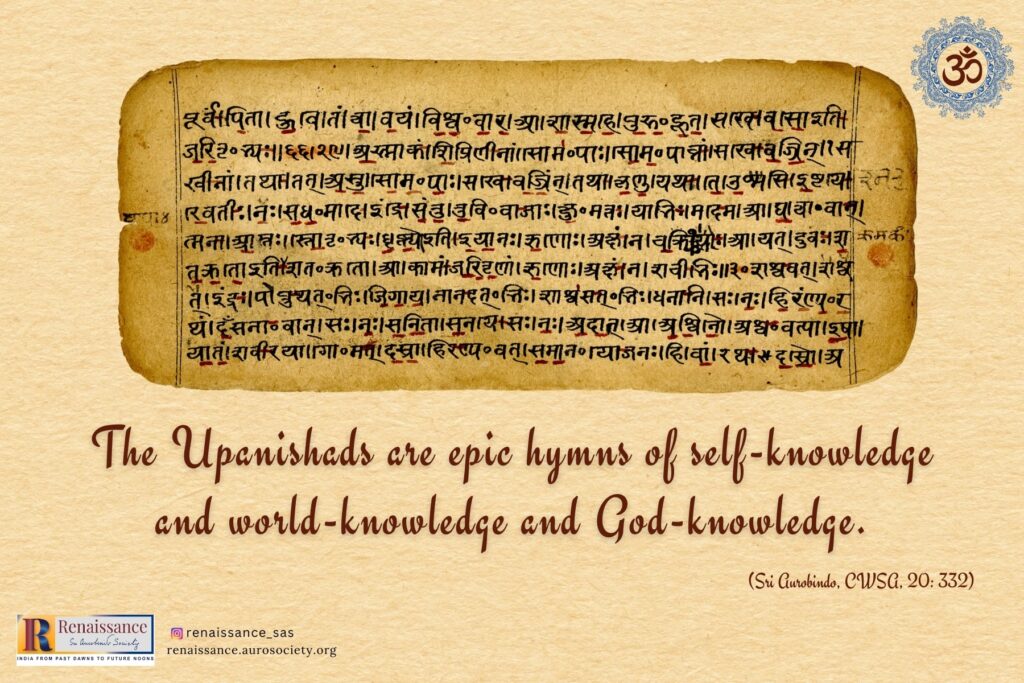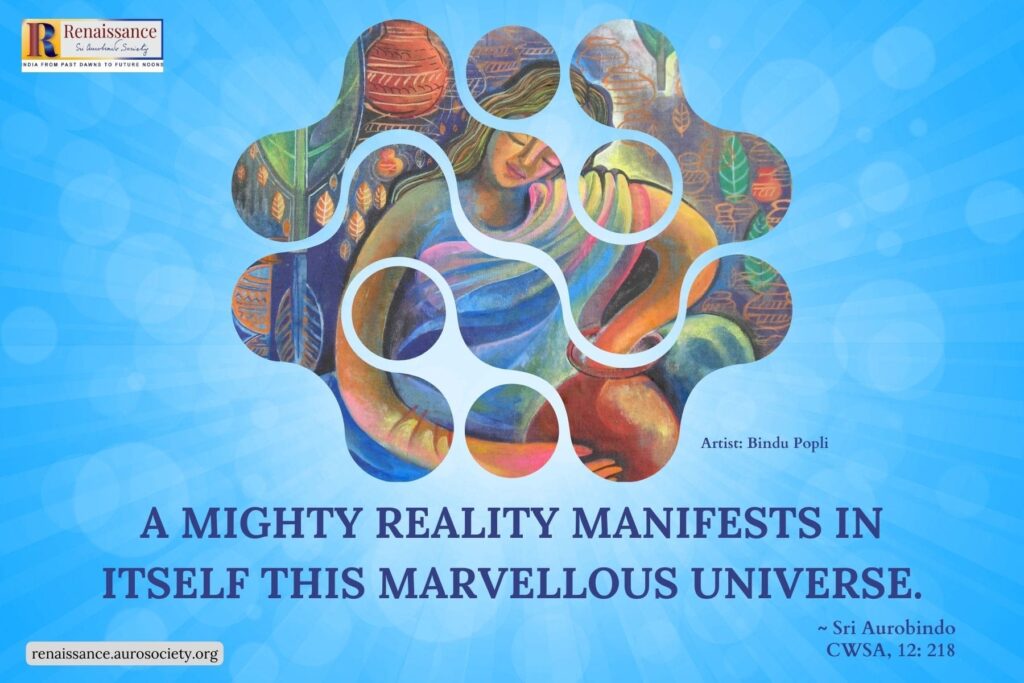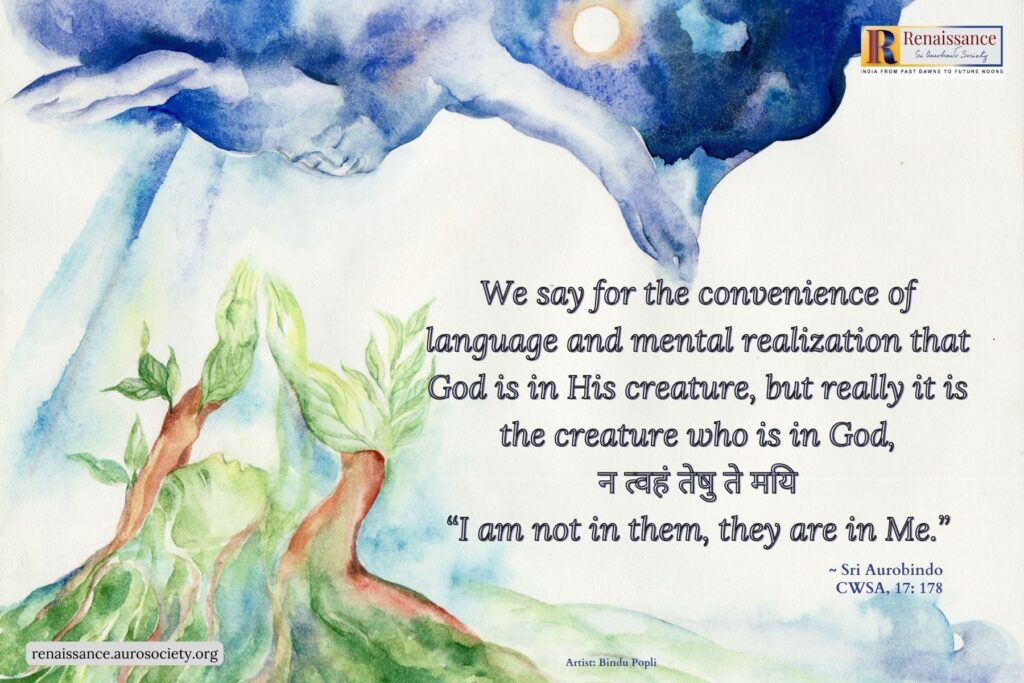Editor’s note: The following essay by M.P. Pandit which summarises some of Sri Aurobindo’s commentaries on the Isha Upanishad was originally published in the 1955 annual issue of Sri Aurobindo Circle. We will be presenting it in 6 parts in Renaissance, with the first introductory part appearing in this issue. The next five parts will focus specifically on the Isha Upanishad. For the sake of readers’ convenience, we have updated the original references by giving appropriate citations from the Complete Works of Sri Aurobindo, and also made minor editorial corrections to the original essay.
PART 1
The Upanishads, Sri Aurobindo points out, are “vehicles of illumination and not of instruction.” (CWSA, Vol. 17, p. 13) They are not intended to present ideas or arguments in the ordered sequence of reasoning. They deliver rather certain key truths and hints to seekers who were expected to be familiar with the broad lines of the Vedic and Vedantic thought and spiritual experience; only they could receive the teachings of the Upanishads in their true value, understand the implied thought behind the verbal expression and follow up the suggestions thrown out by each utterance.
To an age like ours, separated by vast gulfs of time, mode of thought and life, the full significance of the texts is sure to be missed unless what is stated is studied in its proper background, with an intuitive readiness to grasp and correlate the apparently diverse suggestions shooting from their condensed conclusions. And this is precisely the object behind Sri Aurobindo’s commentaries on the Upanishads. He has written only on two or three texts—the Isha, the Kena and partly the Taittiriya. But what he has given goes far to equip the serious student to delve into the other texts as well, since the bases, the lines and goal of all the Upanishads are largely identical.
Besides, his translations of the other texts are themselves effective as short commentaries. His is no word-for-word translation; it is “literary rather than literal” (CWSA, Vol. 18, p. 163), presenting as much as possible, in a modern, occidental language, the thought and spirit of these ancient scriptures. He writes: “I do not say that this translation is worthy of them, for in no other human tongue than Sanskrit is such grandeur and beauty possible.” (CWSA, Vol. 18, p. 167)
But in truth, his translations read like living originals and have the same breath and ring. At times the renderings might appear somewhat paraphrased but they are so done on purpose. They aim at bringing out the complete sense of the passage, the full import of the terms used—which would otherwise escape attention—rather than at scholastic exactitude and are thus of inestimable value for our understanding of these ancient texts.
Before taking a look at his commentary on Isha Upanishad, it is interesting to know what Sri Aurobindo has to say about the translations by western scholars such as the well-known Indologist Max Muller and his own method.


On Translating Upanishads
“The series of translations called the Sacred Books of the East, edited by the late Professor Max Muller, was executed in a scholastic and peculiar spirit. Professor Max Muller, a scholar of wide attainments, great versatility and a refreshingly active, ingenious & irresponsible fancy, has won considerable respect in India by his attachment to Vedic studies, but it must fairly be recognized that he was more of a grammarian and philologist, than a sound Sanskrit scholar.
“He could construe Sanskrit well enough, but he could not feel the language or realise the spirit behind the letter. Accordingly he committed two serious errors of judgment; he imagined that by sitting in Oxford and evolving new meanings out of his own brilliant fancy he could understand the Upanishads better than Shankaracharya or any other Hindu of parts and learning; and he also imagined that what was important for Europe to know about the Upanishads was what he and other European scholars considered they ought to mean.
“This, however, is a matter of no importance to anybody but the scholars themselves.”
[…]
“Professor Max Muller in his translation did not make any attempt to render into English the precise shades of Aryan philosophical terms like Atman & Prana which do not correspond to any philosophical conception familiar to the West; he believed that the very unfamiliarity of the terms he used to translate them would be like a bracing splash of cold water to the mind forcing it to rouse itself and think.”
“In this I think the Professor was in error; his proposition may be true of undaunted philosophical intellects such as Schopenhauer’s or of those who are already somewhat familiar with the Sanskrit language, but to the ordinary reader the unfamiliar terminology forms a high & thick hedge of brambles shutting him off from the noble palace & beautiful gardens of the Upanishads.
“Moreover the result of a scholastic faithfulness to the letter has been to make the style of the translation intolerably uncouth and unworthy of the solemn rhythmic grandeur and ineffable poetical depth and beauty of these great religious poems. I do not say that this translation is worthy of them, for in no other human tongue than Sanskrit is such grandeur & beauty possible. But there are ways and their degrees.”
“For instance, Étadwaitad, the refrain of the Katha Upanishad has a deep & solemn ring in Sanskrit because étad and tad so used have in Sanskrit a profound and grandiose philosophical signification which everybody at once feels; but in English “This truly is That” can be nothing but a juggling with demonstrative pronouns; it is far better and renders more nearly both rhythm & meaning to translate “This is the God of your seeking” however inadequate such a translation may be.
“It may, however, fairly be said that a version managed on these lines cannot give a precise & accurate idea of the meaning. It is misleading to translate Prana sometimes by life, sometimes by breath, sometimes by life breath or breath of life, because breath & life are merely subordinate aspects of the Prana.”
“Atman again rendered indifferently by soul, spirit & self, must mislead, because what the West calls the soul is really the Atman yoked with mind & intelligence, and spirit is a word of variable connotation often synonymous with soul; even “self” cannot be used precisely in that way in English.
“Again the Hindu idea of “immortality” is different from the European; it implies not life after death, but freedom from both life and death, for what we call life is after all impossible without death. Similarly Being does not render Purusha, nor “matter” rayi, nor askesis the whole idea of “tapas”.
“To a certain extent all this may be admitted, but at the same time I do not think that any reader who can think & feel will be seriously misled, and at any rate he will catch more of the meaning from imperfect English substitutes than from Sanskrit terms which will be a blank to his intelligence.”
“The mind of man demands, and the demand is legitimate, that new ideas shall be presented to him in words which convey to him some association, with which he will not feel like a foreigner in a strange country where no one knows his language nor he theirs. The new must be presented to him in the terms of the old; new wine must be put to some extent in old bottles.
“What is the use of avoiding the word “God” and speaking always of the Supreme as “It” simply because the Sanskrit usually,—but not, be it observed, invariably—employs the neuter gender? The neuter in Sanskrit applies not only to what is inanimate but to what is beyond such terms as animate and inanimate, not only to what is below gender but to what is above gender. In English this is not the case.”
“The use of “It” may therefore lead to far more serious misconceptions than to use the term “God” & the pronoun “He”. When Matthew Arnold said that God was a stream of tendency making towards righteousness, men naturally scoffed because it seemed to turn God into an inanimate force; yet surely such was not Arnold’s meaning.”
“On the other side if the new ideas are presented with force and power, a reader of intelligence will soon come to understand that something different is meant by “God” from the ideas he attaches to that word. And in the meanwhile we gain this distinct advantage that he has not been repelled at the outset by what would naturally seem to him bizarre, repulsive or irreverent.”
~ Sri Aurobindo, CWSA, Vol. 18, pp. 163-169



